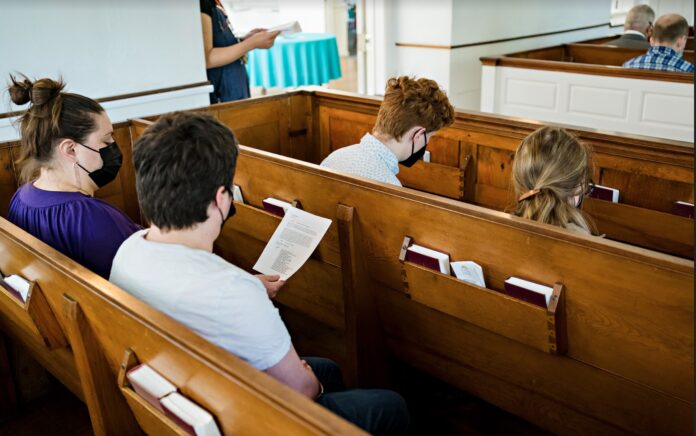
The LGBTQIA+ Committee of the Episcopal Diocese of Pennsylvania is only a few months old, but it has already made a positive impact on LGBTQ+ Episcopalians. LGBTQ people created the committee to foster a welcoming and supportive community for queer and trans people in the Episcopal Church. They do this by hosting evenings of prayer and fellowship, facilitating programming and providing resources and education to promote inclusion and show that LGBTQ people people can have healthy spiritual lives.
“[The other day] we had evening prayer and the vibes were so good, the room was really full,” said Messapotamia Lefae, vice chair of the committee. “It was this kind of intergenerational community storytelling thing that happens where you’re like, ‘when I was younger I was in Catholic school. Hey, you were in Catholic school?’ It started this dialogue about our lived experiences and our challenges with reconnecting with our faith as adults.”
The committee is authorized under the aegis of the Episcopal Diocese of Pennsylvania, and it is governed by non-clergy LGBTQ folks and allies who create the committee’s mission and core values, which are rooted partly in social justice work. The governors also decide which advocacy issues the committee will work to address. The committee partners with parishes within the Episcopal Diocese to produce events and programs.
“There have been a lot of great conversations developing,” said committee chair Alex Ames. “The number of parishes, the number of clergy who have stepped up to the plate to partner with us is really, really impressive.”
Several working groups make up the committee, including the Youth, Families, Parents and Allies Working Group, which facilitates digital resources to help parents, families and friends of LGBTQ people as well as fosters opportunities for LGBTQ youth in the diocese to meet up and explore their faith and identity; the Adult Programs and Enrichment Working Group, which builds virtual and in-person programs and events for LGBTQ people in the diocese as well as grows member participation; and the Governance and Communications Working Group, which leads policy advocacy for the diocese and the Convention and handles communication with the diocese and parishes.
The clergy in the Episcopal Diocese of Pennsylvania were accepting and supportive of the founding of the LGBTQIA+ committee and its mission, Ames said. The Episcopal Church as a whole has largely been an accepting environment for LGBTQ people.
“One of the important messages that we are communicating to our wider church community is that acceptance is a starting point,” Ames said. “We need to move in a direction of active welcome and affirmation and the creation of safe and inclusive spaces and opportunities for the involvement and the leadership of LGBTQIA+ people.”
Ryan Brossa, who has been involved with the committee for the last month or so, comes from a Roman Catholic background, as does Lefae. Both found community in the Episcopal Church after their previous experiences made them feel unwelcome, they said.
“There’s something really powerful in being in community with other queer people sort of navigating this adult version of faith, after I think many of us have these traumatizing and traumatized backgrounds in church,” Brossa said. “I know that I still carry a lot of anger around that. So being in community with other other queer people who are also working through some of that lingering anger and trauma, and working into a new relationship with the church has been really powerful and in some ways really healing for me.”
Lefae’s experience of reconnecting with the church was gradual, she said.
“I feel like the experience of being a queer person in a church has always been on the outside, and just very carefully letting myself get closer and closer to the activity,” Lefae said. She became engaged in the Episcopal Church through community service and volunteer work. “By doing things, I got a chance to know other people and develop trust with some people. And I think that was a really long process and kind of difficult.”
Ames and Brossa discussed the need for the committee to work toward rewriting the harmful narrative that the conservative Evangelical Church has largely propagated, that out LGBTQ people essentially have no place in church communities.
“Part of the work of this commission, and I think that we talk about this as part of the work of the Episcopal Diocese of Pennsylvania, is reclaiming this narrative of what Christianity is and what it can be,” Brossa said. “Trying to bring out to the wider world that Christianity is not just what these groups are saying; there are all of these other ways to be Christian. For me, that’s a really important part of this work: rewriting the narrative in a way that is inclusive and welcoming.”
For LGBTQ people who are thinking of getting involved in the committee, Ames, Lefae and Brossa all welcome new members to become as involved as they’d like in their open-hearted community.
“We as queer people deserve to have a spiritual life, if we desire one,” Ames said. “And we deserve to have the freedom and liberty and curiosity and support to explore the spiritual dimension of ourselves.”
For more information about the LGBTQIA+ Committee of the Episcopal Diocese, visit https://www.diopa.org/lgbtqia/.
